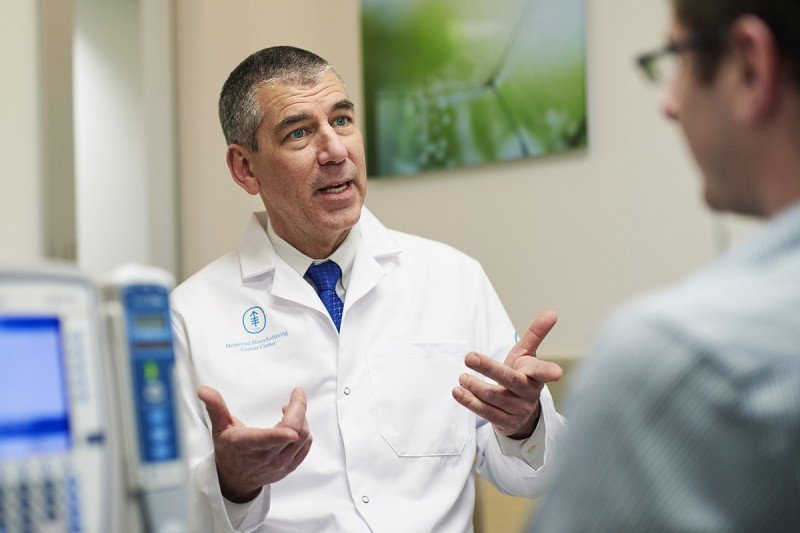
Urology Service Chief James Eastham explains treatment options to a prostate cancer patient.
Earlier this month, the U.S. News & World Report 2016-17 Best Hospitals issue ranked Memorial Sloan Kettering among the top for urology — number five in the nation and number one in the New York City area. This recognition of excellence reflects the dedication and expertise MSK brings to the treatment of people with prostate cancer, bladder cancer, kidney cancer, and testicular cancer, including pioneering many advances that today are the standard of care.
James Eastham, Chief of the Urology Service, explains what is distinctive about care for urologic cancers at MSK.
What makes the care your team offers stand out from other hospitals?
We have experts in every treatment option for all urologic cancers. For prostate cancer — my area of expertise — we offer active surveillance, which involves closely monitoring the disease for changes; robotic or traditional open surgery; all forms of radiation therapy; systemic therapies such as hormone therapy, chemotherapy, and immunotherapy; and focal therapies, which involve treating only the cancerous portion of the prostate rather than the entire gland. For those with higher-risk disease, we offer access to clinical trials. Many centers have one option and try to fit every patient into that one box, be it robotic surgery or CyberKnife-type radiation [a form of stereotactic body radiotherapy]. If you have prostate cancer, your situation is unique and requires consideration of a variety of strategies. Having experts whose top priority is doing what is best for the person, rather than simply offering everyone the same option because it’s what’s available, is one of the things that makes MSK a great place to seek treatment.
For bladder cancer, our experts are skilled at using surgical techniques that can limit your side effects and speed your recovery, keeping in mind that preserving or re-creating the bladder is a key consideration. If you need chemotherapy before surgery, we can help you get through that phase of your treatment much more quickly than other cancer centers can because our bladder cancer experts work so closely together. After surgery, our nurses provide expert support in helping those patients whose bladder was removed and who require a stoma.
For kidney cancer, our specialists are practiced in minimally invasive and kidney-sparing surgery. We also have an active program of clinical trials designed to explore new treatment approaches. MSK is also among the nation’s most experienced in treating testicular cancer, caring for nearly 300 men who are diagnosed each year. For young men who are otherwise healthy, the experts in our Male Sexual and Reproductive Medicine Program regularly provide guidance regarding a variety of fertility and sexual health concerns, including how to store sperm prior to treatment.
Back to topWhat research are you most excited about right now?
In prostate cancer, the two research areas that excite me the most are focal therapy and multimodal therapies — which combine several treatment approaches — for patients with advanced disease who typically are treated only with hormonal therapy. In selected men in whom the cancer can be limited to one area of the prostate, focal therapy can destroy that area using heat, cold, electricity, or light energy. The majority of the prostate is left intact. This treats the cancer yet spares most normal tissue — resulting in better quality of life with fewer side effects. It offers an alternative to traditional surgery or radiation.
We also see great potential in multimodal strategies. Many men with high-risk or metastatic prostate cancer are often treated with only androgen deprivation [hormonal] therapy. We are investigating new approaches that combine systemic therapy [newer hormonal agents], radiation, and surgery, sometimes guided by the genetic makeup of the cancer, to determine if we can improve survival in these men. This is investigational so not all such men are eligible, but this is a potential game changer in the management of advanced disease.
What are some of the ways your team helps ease patients’ recovery?
Cancer naturally causes a great deal of anxiety, not only about life-and-death issues but also about the side effects of therapy. MSK has experts in psychiatry and psychology who lead the field in helping patients and their loved ones deal with all forms of urologic cancer. We also have specialty clinics devoted to helping men manage adverse effects of treatment, such as sexual dysfunction and urination problems.
Back to topHow do quality of life and patient satisfaction factor into your treatment recommendations?
Unfortunately, treatment of cancer does have risks, and patients need to understand these risks clearly. They should be wary of doctors or institutions posting overly optimistic data that are based on misleading factors. One of the main reasons we offer multiple options is because one person may value a particular aspect of care or outcomes that differs from those valued by another person. Listening to patients, understanding their concerns and those of their loved ones, and having a realistic discussion of expectations is critical for patients to be able to make an informed decision.
Back to top